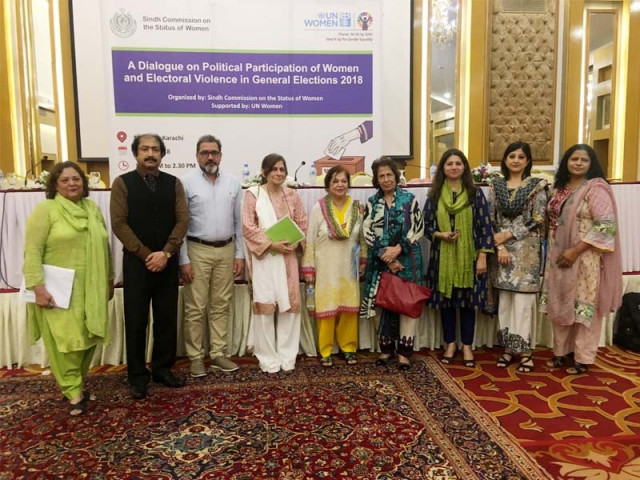'Low representation of women voters, candidates due to persistent patriarchy'
SCSW hosts dialogue to raise awareness of women's political participation issues, develop solutions

A group at a seminar by the Sindh Commission on the Status of Women. PHOTO: EXPRESS
With an aim to shed light on issues regarding gender inequality in the fields of health, education and politics, the SCSW conducted a dialogue, 'Political Participation of Women and Electoral Violence', sponsored by the UN Women, at the Marriott Hotel on Friday.
In her introductory speech, Shirin stated, "Our role is to facilitate women in one province and establish a mechanism that can help us drive away any remaining flaws in the existing system."
How reserved seats for women are reserved for privileged
Referring to a research from 1999, she pointed out how the value of women's votes has increased but continued to emphasise that there is still a long way to go as a wide gap remains between the population of women and number of women voters.
Women's Development Department Secretary Baqaullah Unar highlighted how the implementation of laws and acts regarding women's rights is extremely weak. So many bills such as that of acid protection, dowry, and others are still in process because of the government's lack of interest.
Unar continued on how expensive the election process is and how it has become a game for the wealthy. He was of the opinion that voting must be made compulsory for every individual to ensure a significant change.
Election Commission of Pakistan (ECP) Gender Affairs Additional Director-General Nighat Siddique supported this by highlighting that after making 10% representation of women in votes from every constituency compulsory, the number of votes by women has increased visibly, especially in areas like Lower Dir, where women representation was 0% previously.
If any constituency has a voter turnout of women of less than 10% or any woman is restricted to vote through 'undue influence', the result in the constituency will be nullified and those responsible for these restrictions will be declared guilty under Article 170 of the Election Act, 2017.
According to Siddique, the ECP is working continuously for the rights of women and other minorities. The staff engaged for polling stations is being given gender sensitive training to encourage preferential voting for pregnant women, the elderly, persons with disabilities and transgender persons.
The dialogue was followed by a panel discussion involving nine women candidates from different political parties, such as the Muttahida Quami Movement-Pakistan, Pakistan Peoples Party, Pak Sarzameen Party, Pakistan Tehreek-e-Insaf and independent candidates.
Caretaker Women Development Minister Dr Saadia Virk Rizvi stated that the objective behind the discussion was to encourage a friendly exchange among members of the ECP, contesting candidates and the audience and to provide a platform where people can voice out their opinions and questions.
During the panel discussion, each woman talked about their respective political parties, the kinds of hurdles they face being women and how they cope with those problems. Independent candidate Noami Bashir spoke about how belonging from a minority Christian group has proven to be a hurdle in her campaign. Not only was she bribed to back down from the elections, but people even tried to slam her down by telling her that they would never vote for a Christian woman over a Muslim candidate.
"If Christians do not hesitate to vote for a Muslim candidate, why should a Muslim hesitate while voting for a Christian? It is a matter of merit and not religion," she said.
Four million Balochistan women will not be able to vote in elections
Sindh Human Rights Commission Chairperson Justice (retd) Majida Rizvi, the chief guest, pointed out that the growth of some candidates is restricted by the progress of comparatively newer ones due to the absence of internal elections in a party.
To avoid intra-party conflict, positions should be assigned based on seniority and experience rather than relation or connection, she said.
Supporting what Saman, the UN Women's representative, said that if 50% of a country's population, the women, does not vote, the probability of good leaders coming to the forefront will remain low, Justice (retd) Rizvi stated, "Women empowerment can only happen when women are taken in on the decision making process."



















COMMENTS
Comments are moderated and generally will be posted if they are on-topic and not abusive.
For more information, please see our Comments FAQ